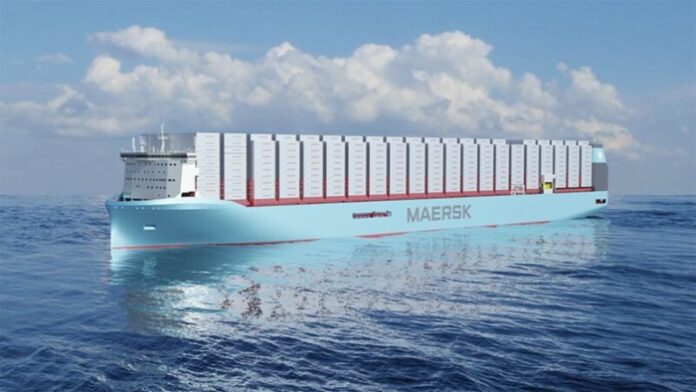
-
Maersk places orders for six additional green methanol-fueled container vessels with Korea’s Hyundai Heavy Industries to replace existing capacity in its fleet
-
The new orders will have a nominal capacity of around 17,000 TEUs and will bring to 19 Maersk’s total orders for vessels with dual-fuel engines that can sail on green methanol
-
When all 19 vessels have replaced older vessels, they will generate annual CO2 emissions savings of around 2.3 million tons a year
A.P. Moller-Maersk ordered six more green methanol-fueled ships from Korean shipbuilder Hyundai Heavy Industries (HHI) to replace existing capacity in its fleet.
The company did not disclose the value of the latest orders.
Maersk announced the new orders on October 5, saying they will have a nominal capacity of around 17,000 twenty-foot equivalent units (TEU). The latest batch will bring to 19 Maersk’s total orders for vessels with dual-fuel engines that can operate on green methanol.
In late August last year, Maersk unveiled plans to launch in early 2024 the first of eight 15,000-TEU container vessels capable of sailing on carbon-neutral methanol.
Two months earlier, its French rival CMA CGM placed its first order for six 15,000-TEU methanol-powered vessels to expand its energy mix and become carbon-neutral by 2050.
When all 19 vessels on order are deployed and have replaced older vessels, they will generate annual carbon dioxide (CO2) emissions savings of around 2.3 million tons a year. The six 17,000-TEU vessels alone will save about 800,000 tons of CO2 emissions annually, Maersk said.
“Our customers are looking to us to decarbonize their supply chains, and these six vessels able to operate on green methanol will further accelerate the efforts to offer our customers climate-neutral transport,” said Henriette Hallberg Thygesen, chief executive of Fleet & Strategic Brands at Maersk.
“Global action is needed in this decade in order to meet the Paris Agreement’s goal of limiting global warming to a 1.5°C temperature rise.”
Maersk is aiming for net-zero emissions by 2040 across the entire business and has set tangible near-term targets for 2030 to ensure significant progress.
These include a 50% cut in emissions per transported container on Maersk’s ocean fleet compared with 2020 and a principle of only ordering newbuilt vessels that can be operated on green fuels.
“Green methanol is the best scalable green fuel solution for this decade, and we are excited to see several other shipowners choosing this path. It adds further momentum to the rapid scaling of availability needed to bring down the premium on green methanol and accelerate the evolution of climate-neutral shipping,” said Palle Laursen, chief fleet & technical officer at Maersk.
Benchmarked against conventional fuel capabilities, additional capital expenditure for the methanol dual-fuel capability is 8-12%, an improvement compared with when Maersk ordered eight vessels with the same technology last year.
The six green methanol-fueled ships will all be delivered in 2025 and sail under the flag of Denmark, Maersk said. They will all come as part of the company’s ongoing fleet renewal program in which the new capacity will replace an equal amount of capacity reaching end-of-life and leaving the fleet.
The new orders reiterate further Maersk’s strategy of maintaining its fleet capacity at a maximum of 4.3 million TEUs, as a combination of Maersk-managed and time-chartered vessels.
The shipping industry’s shift to carbon-neutral fuel is pursuant to the December 12, 2015 Paris Agreement under which leaders of United Nations member-countries committed to attaining net-zero greenhouse gas emissions in their industries by 2050.




